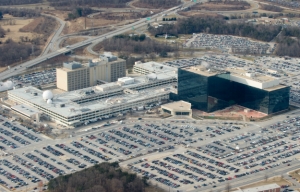When America Became a Cyberwarrior

Aerial view of the National Security Agency, also headquarters for U.S. Cyber Command. Credit: National Security Agency.
This post can also be found on ForeignPolicy.com.
By Jeffrey T. Richelson, Malcolm Byrne
At a time when Chinese malware is targeting America’s computer infrastructure and U.S.-Israeli worms (e.g., Stuxnet) have reportedly attacked Iranian centrifuges, a recently declassified item from the National Security Agency (NSA) offers a little history on how at least one part of the U.S. government foresaw its role in the growing field of “Information Warfare.”
This short item from a classified NSA publication reveals that as far back as 1997 the super-secret agency was tasked with finding ways not just to listen in on our enemies (the NSA’s usual stock-in-trade), but actually to attack hostile computer networks. The document proclaimed that “the future of warfare is warfare in cyberspace,” and it sketched out how tomorrow’s “Information Warriors” would think, act, and fight on the new digital battlefield.
The NSA’s involvement in cybersecurity is an outgrowth of its longtime role in ensuring communications and information security for various components of the government and private sector, in addition to its need to guarantee the security of the computers it has relied on heavily for decades. Its role in computer-network exploitation — of gathering electronic “data at rest” — is a natural extension of its decades-old role of gathering “data in motion” via signals intelligence.
According to the document’s author, a former special assistant to the NSA’s director, the new activities — not just “exploitation” and “protection,” but “attack” — were “sure to be a catalyst for major change” at the agency. But, he pointed out to his colleagues, there should be no doubt that a new age of warcraft was dawning, brought about in no small part by changing mores in American society. Because of the information age, he wrote, “physical combat can be viewed in living rooms of America via television,” and as a result, “[t]he horrors of war cannot be hidden.” Therefore, “in the simplest of terms, ‘body bags’ are no longer acceptable,” and there is “considerable societal pressure to find non-lethal means of accomplishing tasks that once called for conventional military action.”
By all accounts, we’re now seeing signs of that new-age approach, although whether its repercussions will be entirely non-lethal remains to be determined.


Trackbacks
Comments are closed.